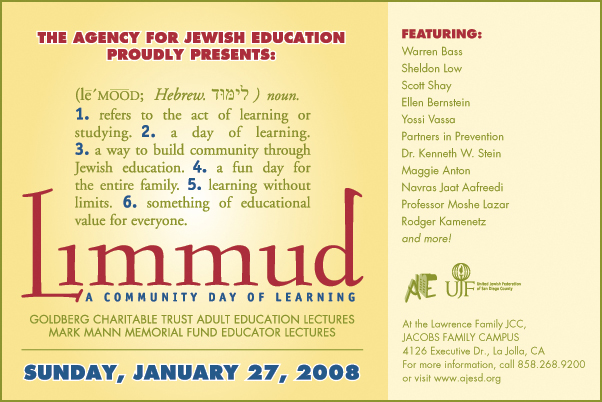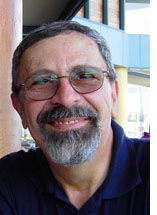| |
|


THE VIEW FROM JINSA
Bush's Middle East trip a disappointment
By Shoshana Bryen
 WASHINGTON, DC—Maybe it was the Martin Luther King holiday and remembering the soaring rhetoric aimed at our better angels and the principles Americans strive, often imperfectly, to practice. President Bush was a serious disappointment in the Middle East. No, this is not a syntax joke. Mr. Bush is fully capable of soaring rhetoric - check his speech at Whitehall, or the June 24th speech on the Palestinians, or his post-9-11 speech to the Joint Session of Congress. It wasn't how he said it that troubles us. It was what he said or didn't say. WASHINGTON, DC—Maybe it was the Martin Luther King holiday and remembering the soaring rhetoric aimed at our better angels and the principles Americans strive, often imperfectly, to practice. President Bush was a serious disappointment in the Middle East. No, this is not a syntax joke. Mr. Bush is fully capable of soaring rhetoric - check his speech at Whitehall, or the June 24th speech on the Palestinians, or his post-9-11 speech to the Joint Session of Congress. It wasn't how he said it that troubles us. It was what he said or didn't say.
He told the Palestinians and Israelis to "make peace," i.e., to make a Palestinian state and stop building houses for Jews (a key Saudi demand). Not a word by the President (or Mr. Olmert) about Sderot, Gilad Shalit or
Shoshana Bryen
halting incitement to violence in the Palestinian institutions Abu Mazen still controls. Not a word about the Palestinian civil war or the Palestinian war against Israel. He was, at least, sincere at Yad Vashem.
On to Saudi Arabia and the announcement of an enormous, sophisticated arms sale to the kingdom. The President threw his rhetorical arms around King Abdullah. Not a demand in sight. No brave speeches about democracy, civil society, women's rights or religious freedom. Mr. Bush made sure he didn't arrive on a Sunday. [Ironically, Michael Abramowitz of The Washington Post said, "There is a bond between the president and the king... They are both religious men - obviously, of different faiths - and I think they share that." We suspect he didn't ask to visit the Riyadh synagogue.]
We are not big Bush/Saudi conspiratorialists. Every American president since FDR has been in bed with Saudi interests because our country runs on their oil. President Clinton was no less kissy with the Saudis, and our next president is unlikely to be either unless we suddenly drill for domestic oil or make a breakthrough in hydrogen fuel cells. Both possible; neither likely. The Saudis are not alone responsible for $100/bbl oil and we understand the President's desire to have some of that money recycled to the United States rather than France, Britain or Germany in pursuit of arms.
But we thought Mr. Bush at least understood the fight. Radical Islamists, Sunni and Shiite, have declared war on the principles of tolerance; diversity; equality; freedom of speech, dress and thought; and on other, less radical, more tolerant forms of Islam and on tolerant Muslims themselves - in short, war on every principle for which America stands. People are dying every day in this war, and Saudi/Wahhabi intolerance of "the other" and support for al Qaeda - like Iranian support for Hezbollah - increases the threats to the United States and to our real friends in the region.
OK, explicitly criticizing a society that imprisons rape victims and beheads people in the public square would be rude while standing there, but Mr. Bush could reasonably have quoted Ronald Reagan, Martin Luther King, or Thomas Jefferson. Friends and enemies of freedom would both have understood.
Instead, he went like a peddler with his wares on his back, sounding more like "Chicken Kiev" than "Tear this Wall Down" or "I Have a Dream." He failed the people of the region who put their hopes in him and failed his people at home.


Iran vs. Israel, U.S. vs. Russia, making Eurasia increasingly tense, unstable
By Peter Garas
 CANBERRA, Australia—Security concerns or economic necessity make for strange bedfellows at times. The most recent news, that Israel has acted in cooperation with India to launch a spy satellite, is a case in point. CANBERRA, Australia—Security concerns or economic necessity make for strange bedfellows at times. The most recent news, that Israel has acted in cooperation with India to launch a spy satellite, is a case in point.
The BBC reports:
India has successfully launched an Israeli spy satellite into orbit, officials at the Sriharikota space station in southern India say.
The Israeli press is reporting that the satellite will improve Israel's ability to monitor Iran's military activities.
Peter Garas
Of course many people outside of the two countries concerned will look upon this achievement as a new and sinister deal between the Indian and Israeli governments. They may well be right.
On the other hand it would be just as well to consider other possibilities like the fact that the Indian space program which has been going on since 1963 and costs a fortune, is in the business of making deals enabling iit to compete with the existing commercial programs elsewhere in the world. With the US, Russia, China, the Ukraine and the European Space Agency providing commercial satellite launch services, the market is worth about $2.5 billion a year.
Israel is actually the second country in the world to avail itself of Indian facilities. Italy was the first last year, putting into orbit a satellite for the mere bagatelle of $11 million.
I suspect that it would be difficult for conspiracy theorists to suggest that this meant some sinister collusion between the Italian and Indian governments or worse still, some plot between Hindu dominated India and Catholic dominated Italy that was hostile to the Islamic world.
Which is probably why no one has suggested that possibility.
Still, Israel is always different. People can suggest all sorts of conspiracies as emerging from that country and actually get their arguments onto the world stage.
The situation in Iran is serious not just for Israel, but for the whole world community.
There is one argument which would suggest that by leaving the regime alone it will implode from inside because of its own citizens' reactions against the current regime and its directions. Indeed the proponents of this view suggest that the hostility from President Bush and the USA is actually keeping the regime in power by uniting Iranians against what is perceived as a hostile external threat.
The reality is that the whole region is currently very unstable with the Americans in Iraq and in Afghanistan. The US has not been helping by surrounding Russia with missile installations and building an anti missile shield (ably supported by countries like Israel and Japan who actually test some of the weapons systems with and/or for them) and the Russians countering with changes to their military strategies.
For example only last week General Yuri Baluyevski, Russia's Chief of Military Staff said:
We do not intend to attack anyone, but we consider it necessary for all our partners in the world community to clearly understand ... that to defend the sovereignty and territorial integrity of Russia and its allies, military forces will be used, including preventively, including with the use of nuclear weapons.
Other recent statements from the Russians indicate that they are feeling threatened and are responding with shows of determination against what they see as the aggressive posture of the USA and its allies. The Russins also are concerned about threats from terrorists of whatever persuasion and the perceived instability in their immediate region. Let us not forget that Iran is situated along the borders of some of the most sensitive places on earth.
It is moot whether the USA can really afford to maintain this level of involvement in so many different parts of the world at the same time as it faces issues at home of the lame duck Presidency of George Bush, the impacts of global warming, the decline in its economic power thanks to the impact of the sub-prime mortgage fiasco, the ever increasing manufacturing prowess of both China and India and above all the reality that it has stretched its military thinly across too many crisis spots around the world.
In the opinion of this writer, the world is actually a far more dangerous place in 2008 than it has been some decades and 2008 promises to be a year in which many of the misadventures of different people in power and circumstances are likely to combine to face the world with one crisis after another until the sheer volume of all of these things create a form of instability that will be difficult if not impossible to control.




THE JEWISH CITIZEN
Documentary examines bar mitzvah of Lior Liebling, enthusiastic student with Down's
By Donald H. Harrison
 SAN DIEGO -- Lior Liebling, who has Down Syndrome (though he jokes he has Up Syndrome), studies for and completes his bar mitzvah in the documentary Praying with Lior which examines not only the young man’s relationship to Judaism in its diverse forms, but also to his late mother, father, stepmother, brother and two sisters. SAN DIEGO -- Lior Liebling, who has Down Syndrome (though he jokes he has Up Syndrome), studies for and completes his bar mitzvah in the documentary Praying with Lior which examines not only the young man’s relationship to Judaism in its diverse forms, but also to his late mother, father, stepmother, brother and two sisters.
Family members are self-consciously awkward at times—all except for Lior who is naturally awkward and therefore endearing. Older brother Yoni’s
Donald H. Harrison
expressions of love and admiration for his brother seem more heartfelt than even those of Lior’s father, whose constant advice, cajoling, and public parenting of Lior at times feel contrived, even intrusive.
 The 87-minute documentary by Ilana Trachtman chronicling Lior’s life has been hailed by organizations advocating for children with special needs because it shows Lior for the complex human being that he is, rather than as a person who is defined by a condition. The documentary will be shown at the 18th Annual San Diego Jewish Film Festival at 7:30 p.m. Monday, Feb. 11, with filmmaker Trachtman scheduled to be in attendance. The 87-minute documentary by Ilana Trachtman chronicling Lior’s life has been hailed by organizations advocating for children with special needs because it shows Lior for the complex human being that he is, rather than as a person who is defined by a condition. The documentary will be shown at the 18th Annual San Diego Jewish Film Festival at 7:30 p.m. Monday, Feb. 11, with filmmaker Trachtman scheduled to be in attendance.
Although his rabbinical parents are members of the Reconstructionist movement, they decide to send him to an Orthodox cheder, which they believe answers his need for consistency, certainty, and routine in his life. Lior additionally attends special education classes.
“He is slow but he is not stupid,” Lior’s father, Rabbi Mordechai Liebling, comments early in the documentary, and we see proof of that in the way that the boy is able to lead his classmates in enthusiastic, although usually off-key, prayer songs. The classmates have been briefed well by their teacher, who has instructed them that in Hashem’s eyes everyone is perfect and everyone has his or her roles. Perhaps Lior’s special role is to challenge them to be accepting of his outward imperfections.
Noting the kavanah with which his brother davens, Yoni suggests that it is possible that Lior is closer to God than anyone else in the family, notwithstanding that both his father and late mother were ordained as rabbis. Perhaps so, but when people suggest that Lior may even have keener spiritual insight than most people, other family members reject this suggestion. Lior’s an endearing, at times mystifying, child, but a child nevertheless.
The documentary honestly depicts the jealousy that Lior’s younger sister feels over all the attention that he gets; she even voices the sentiment that as the youngest child, she, rather than he, should be in the spotlight.
If there is any discomfort in watching this film, it is because one gets the feeling that Lior is being trotted out to give performances, the way a young prodigy might be asked to play the piano or the violin for the company. Until a scene when father and son visit the cemetery, it all seems so very staged.
But in the cemetery, where Lior’s mother—the late Rabbi Devora Bartnoff—is buried, there occurs a powerful scene that transcends the obtrusiveness of film making. Instead of paying his respects and then leaving, Lior hugs his mothers’ stone with all his might, all his heart, and all his soul, and tearfully declaims how much he wants for her to return for his bar mitzvah. Rabbi Liebling, overcome, stops directing and bawls with his son.
As you might expect, the bar mitzvah itself also is something of a tear-jerker—as you see the impact Lior’s accomplishment has upon his family and his congregation. Yoni, who has decided he will attend a college in the Northeast part of the United States, so as not to be too far from his brother, in particular is moved by the occasion.
SAN DIEGO JEWISH WORLD THE WEEK IN REVIEW
Judy Lash Balint in Jerusalem: The many cultures of winter in Israel
Cynthia Citron in Los Angeles: Women’s roles in modern Judaism, Islam and Catholicism topic of Brandeis confab
Peter Garas in Canberra, Australia: South Africa cuts neighbors' power but somehow there is no international outcry
Donald H. Harrison in San Diego: Some spiritual L-DOPA for an aged kibbutz
Ira Sharkansky in Jerusalem: Suffering for its public relations value
Congressman Bob Filner in Washington, D.C.: Former Freedom Rider remembers MLKGail Feinstein Forman Sandi Masori in La Jolla, California: What do you know? I am a Jew after all.Sheila Orysiek in San Diego: Tu B'Shevat: Celebrating the perfection of a tree
Gerry Greber in La Jolla, California: A harrowing tale of death, survival at sea
Rabbi Baruch Lederman in San Diego: The mousetrap and the farm animals
Rabbi Leonard Rosenthal in San Diego: The modern meaning for Tu B'Shevat
Ira Sharkansky in Jerusalem: Fatah to end ceasefire. Are they kidding?
Carol Davis in San Diego: Globe scores 'KO' with In This Corner
Donald H. Harrison in San Diego: Half Russian story explores love and dance
Sheila Orysiek in San Diego: Autobiography of a blue checkered shirt
Norman Greene in San Diego: 2 mothers experience tragedy, resilience
Donald H. Harrison in San Diego: Speakers at citizenship ceremony glamorize U.S. history; gloss over mistakes of the past Reader reaction
Fred Reiss in Winchester, California: The clash of science and fundamentalism
< BACK TO TOP
|
|

